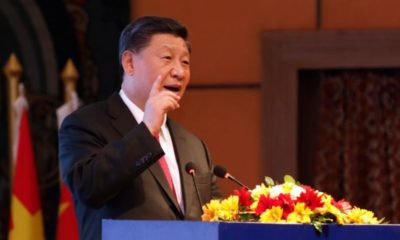World
China imposes one-year ban on ivory imports as hunting trophies

Beijing: Chinese authorities on Thursday announced a one-year ban on imports of African ivory acquired as hunting trophies in the country’s latest effort to fight wildlife poaching and trafficking.
In a statement on its website, the State Forestry Administration (SFA) said it would stop approving imports until October 15, 2016.
An unnamed official with the agency said the move underscored the stance of the Chinese government in wildlife protection and a concrete step forward in its efforts, as per reported.
The policy follows a one-year ban in February on imports of African ivory carvings acquired after the Convention on International Trade in Endangered Species of Wild Fauna and Flora (CITES), which took effect in 1975.
The SFA said a review, which would decide whether the measure should be extended, on the February ban was under way.
The trade and sale of ivory carvings is legal in China if the activities conform with certain regulations. Ivory may only come from two sources — items imported before the country joined CITES in 1981, and 62 tonnes of raw-ivory stock bought from four African countries in 2008, as permitted by the CITES.
Raw elephant ivory and its products should only be processed at designated places, sold by certain outlets and be individually tracked. Each legal product has been cataloged and is traceable by its own unique photo ID.
During President Xi Jinping’s visit to the US last month, the two countries committed to nearly-complete bans on ivory import and export, including significant restrictions on ivory hunting trophies, and regulation to halt the domestic commercial trade of ivory.
World
Lockdowns in China Force Urban Communities to Defy Censorship and Vent Frustration Online

Shanghai’s rich middle class is leading a wave of online dissent over the strict and prolonged lockdowns imposed in various parts of the country. Chinese internet censorship is struggling as patience is wearing thin in many urban centers, coming up with creative forms of online protests.
Social Media Posts Revealing Lockdown Tension in Shanghai
Drawn-out lockdowns are nothing new in China as authorities insist with the nation’s zero-Covid policy since the start of the pandemic. Currently over This time around, however, metropolitan areas like Shanghai are increasingly difficult to keep quiet, given that its more than 25 million residents have seen weeks of total isolation along with food shortages and many other service interruptions.
Dozens of towns and reportedly over 300 million Chinese citizens have been affected by lockdowns of different severity. As expected, urban netizens have been most outspoken over their difficulties by finding creative ways to get around state censorship and bans placed on topics, news comments and spontaneous campaigns.
Shanghai residents have been using mobile proxies and hijacking seemingly unrelated hashtags to talk about healthcare issues, delivery failures and the overall severity of their situation. The “positive energy” that the Chinese government wants to transmit during the recent prolonged series of lockdowns does not come naturally to those counting food supplies and online censors are working hard to filter words, trending topics and undesired social media sharing.
WeChat groups and message threads are under constant monitoring. Posts questioning the zero-Covid approach have been quickly deleted, including by leading Chinese health experts like Dr. Zhong Nanshan. Video footage is soon censored and protests and investigations are quickly made to disappear.
Where this has not worked, officials have exposed banners with warnings and outright threats like “watch your own mouth or face punishment”, while drones have been patrolling the city skies. Yet, if anything, this has led to further tensions and unspoken confrontation with Shanghai’s educated and affluent middle class.
Creative Online Solutions Harnessing Civic Energy
Announcements by Chinese social media that they would be publishing the IP addresses of users who “spread rumors” have not helped either. Tech industry research has shown that much of Asia’s tech-savvy population has a habit of using mobile proxies and other privacy tools, quickly finding workarounds to browse the internet freely and talk to the world about the hottest topics.
The sheer volume of forbidden posts is already a challenge for the very censorship system, experts explain. Unable to track all trending hashtags, state workers overlook topics that speak about the US, Ukraine or other popular news. Linking human rights elsewhere to their situation, Chinese online dissidents establish their informal channels and “hijack” the conversation to share personal or publicly relevant information about the Covid suppression in their town.
Sarcastic and satirical posts still dominate. Others hope to evade the censors by replacing words from famous poems or the national anthem. One thing is certain – social media, when harnessed with the right creativity, has proven its ability to mount pressure on the government in even some of the most strictly controlled tech environments like China.























